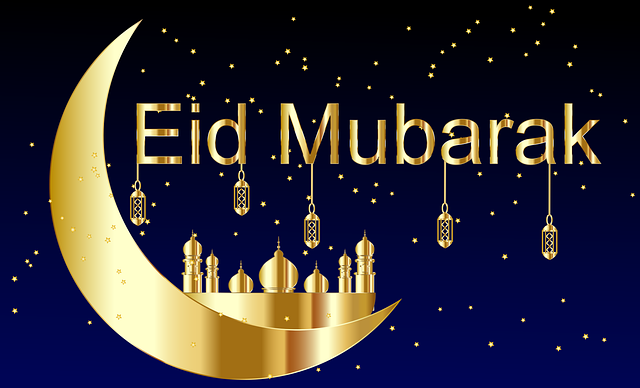Eid Mubarak: The Meaning and Significance of This Muslim Greeting
Eid Mubarak is a common greeting used by Muslims around the world to celebrate the end of Ramadan and the beginning of the festival of Eid al-Fitr. The phrase “Eid Mubarak” is derived from Arabic, and it means “Blessed Eid.” In this article, we will explore the meaning and significance of this greeting, as well as the customs and traditions associated with Eid al-Fitr.
Meaning of Eid Mubarak
Eid Mubarak is a simple phrase that conveys a powerful message of goodwill and blessings. The word “Eid” means “festival” or “feast,” and “Mubarak” means “blessed” or “fortunate.” Therefore, when someone says “Eid Mubarak,” they are essentially wishing their fellow Muslims a blessed and joyous Eid.
The phrase conveys a message of happiness, blessings, and prosperity. The word “Eid” means “celebration” or “festival,” and “Mubarak” means “blessed” or “fortunate.” When combined, the phrase “Eid Mubarak” means “blessed celebration” or “Happy Eid.”
While “Eid Mubarak” is the most common Eid greeting, in many Arab countries, people also use the phrase “Eid Saeed,” which means “Have a Happy Eid” in English. Both greetings convey the same message of happiness, blessings, and well wishes for the occasion.
The greeting is typically exchanged during the three days of Eid al-Fitr, which is celebrated immediately after Ramadan, the month of fasting. Eid al-Fitr is a time for Muslims to express gratitude for the blessings they have received during the month of Ramadan, and to celebrate the end of a period of self-reflection, discipline, and spiritual growth.
Customs and Traditions Associated with Eid al-Fitr
Eid al-Fitr is one of the most important festivals in the Islamic calendar, and it is celebrated with great enthusiasm and fervor by Muslims all over the world. There are many customs and traditions associated with this festival, and these vary from region to region and from culture to culture.
One of the most important customs associated with Eid al-Fitr is the Eid prayer, which is typically held early in the morning on the first day of Eid. The prayer is performed in a congregation, and it is preceded by a sermon, or khutbah, which is delivered by the imam.
Another important tradition associated with Eid al-Fitr is the exchange of gifts and greetings. It is customary for Muslims to exchange gifts with friends and family members during the festival, and to wish them a blessed Eid by saying “Eid Mubarak.”
In addition to these customs, there are many other traditions associated with Eid al-Fitr, such as preparing special meals, wearing new clothes, and decorating homes with lights and colorful decorations.
Significance of Eid al-Fitr
Eid al-Fitr is a significant festival in the Islamic calendar, and it holds great religious and cultural significance for Muslims all over the world. The festival marks the end of a month-long period of fasting and self-reflection, and it is a time to celebrate the blessings of Allah and to express gratitude for these blessings.
In addition to its religious significance, Eid al-Fitr also has important social and cultural significance. It is a time for families and friends to come together, to share meals and gifts, and to strengthen their bonds of love and friendship. It is also a time to reach out to those in need and to offer support and assistance to those who are less fortunate.
Conclusion
In conclusion, Eid Mubarak is a simple greeting that carries a powerful message of goodwill and blessings. It is a common phrase used by Muslims around the world to celebrate the end of Ramadan and the beginning of Eid al-Fitr. This festival is celebrated with great enthusiasm and fervor by Muslims all over the world, and it holds great religious, social, and cultural significance. By exchanging greetings and gifts, sharing meals and prayers, and strengthening our bonds of love and friendship, we can make Eid al-Fitr a truly blessed and joyous occasion.
Read More : Some interesting Facts about Eid al-Fitr
Returning the greetings of ‘Eid Mubarak’
Returning the greetings of ‘Eid Mubarak’ is an important part of the Eid al-Fitr celebration. It shows respect and acknowledges the good wishes of the person who greeted you. There are a few different ways to respond to the greeting, depending on your preference and cultural traditions.
One of the most common responses is to simply say “Eid Mubarak” back to the person who greeted you. This is a simple and straightforward way of returning the greeting and acknowledging the well wishes.
Another response that is often used is “JazakAllah Khair” which means “May Allah reward you with goodness.” This is a way of expressing gratitude for the good wishes and acknowledging that the blessings come from Allah.
In some cultures, it is also common to add an additional phrase to the response, such as “kul ‘am wa antum bi-khair” which means “May you be well every year.” This is a way of extending the good wishes and expressing hope for the person’s wellbeing in the future.
Overall, there is no right or wrong way to respond to the greeting of ‘Eid Mubarak.’ The most important thing is to acknowledge the well wishes and express gratitude for them. By doing so, we can spread joy and positivity during the festive season and strengthen our bonds with family and friends.
History of Eid Mubarak
Eid Mubarak has its roots in the early days of Islam, and its history dates back to the time of Prophet Muhammad (peace be upon him) in the 7th century.
The greeting of “Eid Mubarak” has also evolved over time, with different regions and cultures adopting their own versions of the phrase. In some parts of the world, such as in Arab countries, people prefer to say “Eid Saeed,” which means “Have a Happy Eid” in English. But regardless of the language or dialect used, the message of Eid Mubarak remains the same – a wish for happiness and blessings during this special time of year
FAQs about Eid Mubarak
Here are some frequently asked questions about Eid Mubarak:
What is Eid Mubarak?
Eid Mubarak is a traditional Muslim greeting used to celebrate the end of the holy month of Ramadan and the beginning of Eid al-Fitr. The phrase “Eid Mubarak” means “blessed celebration” or “Happy Eid.”
When is Eid Mubarak celebrated?
Eid al-Fitr is celebrated on the first day of Shawwal, the tenth month of the Islamic lunar calendar. The exact date of Eid Mubarak varies from year to year, depending on the sighting of the new moon.
How is Eid Mubarak celebrated?
Eid Mubarak is celebrated with prayers, feasting, and social gatherings. Muslims attend the Eid prayer in the morning, followed by family and community gatherings where they exchange greetings and gifts. Special foods and sweets are also prepared for the occasion.
What is the significance of Eid Mubarak?
Eid Mubarak is significant because it marks the end of Ramadan, the month of fasting, prayer, and self-reflection. It is a time for Muslims to express gratitude for the blessings received during the holy month and strengthen bonds with family and friends.
What are some common Eid greetings?
Aside from “Eid Mubarak,” other common Eid greetings include “Eid Saeed,” which means “Have a Happy Eid” in English, and “Taqabbal Allahu minna wa minkum,” which means “May Allah accept from us and from you” in Arabic.
How can I respond to Eid greetings?
One common response to Eid greetings is to simply say “Eid Mubarak” back. Another response is “JazakAllah Khair,” which means “May Allah reward you with goodness.” It is also common to add an additional phrase, such as “kul ‘am wa antum bi-khair,” which means “May you be well every year.”
For more information on Eid al-Adha, click here
Please Subscribe Us to get updated with Qatar News, Saudi News, Kuwait News, Health News, UAE News, Iqama, Visa, Jobs, Banking and More..



